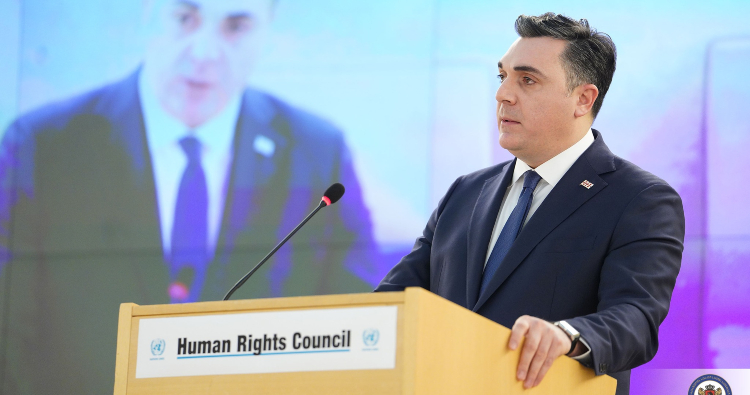Georgian FM raises human rights situation in Russian-occupied regions at UN Council

The Minister also highlighted steps taken by his Government to ensure protection of human rights, and noted the importance of its approval of the 2022-2030 National Strategy for the Protection of Human Rights and the related 2024-2026 Action Plan. Photo: Ilia Darchiashvili/Facebook
Georgian Foreign Minister Ilia Darchiashvili on Monday raised the topic of the human rights violations in the country’s Russian-occupied regions of Abkhazia and Tskhinvali (South Ossetia) at a United Nations Human Rights Council session.
Addressing the 55th session of the body in Geneva, Darchiashvili emphasised the necessity of establishing an international monitoring mechanism in both regions.
The Minister also highlighted steps taken by his Government to ensure protection of human rights, and noted the importance of its approval of the 2022-2030 National Strategy for the Protection of Human Rights and the related 2024-2026 Action Plan.
We believe the strong position of the international community is decisive for Russia to fulfil its international obligations - including the 2008 ceasefire agreement, concluded with the mediation of the European Union - and withdraw its military forces from the territory of Georgia”, he told the session.
He also pointed out the significance of support of the international community and their role both in protecting human rights and peaceful conflict resolution, while also highlighting the importance of a resolution at the Human Rights Council for reaffirming the body’s commitment to the sovereignty, independence and territorial integrity of Georgia within its internationally recognised borders.
Glad to participate in the high level segment of the 55th session of @UN_HRC. Delivered a speech about the Georgian government's policy and contribution to fostering human rights across the country. Strongly accentuated the difficult human rights situation in ????????'s occupied… pic.twitter.com/zFjMWXMCPp
— Ilia Darchiashvili (@iliadarch) February 26, 2024
Darchiashvili once again confirmed his Government’s “unwavering support” for Ukraine's sovereignty and territorial integrity while speaking about the challenges in the Black Sea region.
The Minister added the “full use” of the mandate of the UN Human Rights Council was “critically important” given “current challenges”, and confirmed his country’s “readiness” to take “concrete steps” in human rights protection, both at national and international levels.
Scheduled to run through April, the agenda for the session involves discussion of human rights violations around the world and further development of international human rights obligations.
 Tweet
Tweet  Share
Share